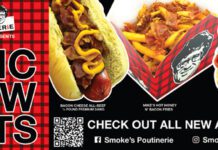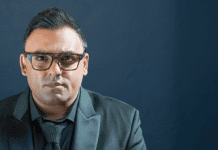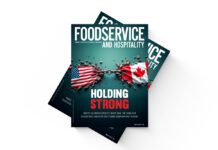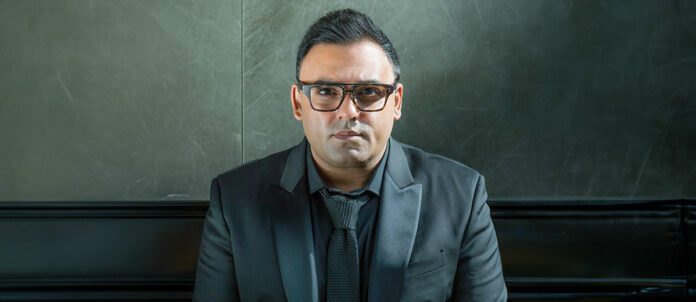Interview by Rosanna Caira
F&H’s editor/publisher Rosanna Caira sat down with the CEO of Scale Hospitality to discuss his journey in the hospitality industry and his experiences in building a restaurant empire through partnerships and innovation, emphasizing the crucial role of people and culture in success. This is an excerpt from the full interview, which took place on May 28th as part of the Icons & Innovators session at KML’s Top-30-under-30 Summit.
Rosanna Caira: Tell us a little bit about your hospitality journey.
Hanif Harji: As a first-generation immigrant, hospitality was never an option in my mind. Get educated, get a degree, become a doctor, lawyer, accountant — that’s the kind of the path our family wanted for me. But unfortunately, my dad got ill when I was in university, and I started thinking about how I could take care of the family. Hospitality, food franchises, was an option that was very real for us and we ended up buying a Second Cup location in 1997. I became immersed in the hospitality world, understanding systems and really looking at hospitality holistically. I realized you need to have the skill set to hire and train people properly, you need to have the skill set to find good real estate, acquire that real estate, negotiate a lease. You have to have design aesthetic, understanding how you need your store designed for operational flow. You need to be financially savvy and understand how to make money — that was just all encompassing for me and I fell in love with the notion of being able to make people happy, serve great food and make a profit — all at the same time.
[I chose] Second Cup because it was a really interesting time for specialty coffee. Starbucks hadn’t entered the market yet. I felt that specialty coffee was a category that was growing and I wanted to be involved in an industry that was in growth mode. And so, when the opportunity came up to be able to open a business, my first reaction was to go to Starbucks and try to get a franchise, which they very quickly told me ‘absolutely not’ since they weren’t franchising in Canada. I had no credit history and was 20 some years old.
But I persevered. I didn’t take no for an answer and I found an alternative [in Second Cup] that had growth potential, a leadership team at that time that was open-minded to ideas and really helped me get engaged in the business. The biggest challenge for me at the time was finding financing because I was fresh out of school, had no credit history and never really had a job. But they were helpful. My uncles were in the hotel business in the limited-service space and they gave me some advice, introduced me to people and by hook or by crook, I got some financing and picked a location we felt had a ton of potential but was underserved.
RC: What are the biggest challenges of running a restaurant with partners?
HH: Managing expectations, communicating different paths each of you want to take along the way and really supporting each other and making sure we’re there for one another as we grow our independent businesses as well.
RC: When you look at the structure of restaurants, what do you think is the most important element for success?
HH: It starts with people. Everything we do in this industry is stressful — recruiting, hiring, training, inclusiveness of the concept with the people that you want to run the business. That’s at the core but everything matters. If you don’t design the space right, if you don’t communicate the message properly, if you cut corners, people notice, especially in such a sophisticated food market. My uncle used to say, ‘if you’re driving on a road that’s curving on a mountain and you don’t have your headlights on, there’s a very good chance you’re going to fall off the cliff.’ And so, we do a concept read for every concept we do. We travel to different cities to see similar or inspirational concepts and we actually write out a full concept brief. We write out a draft menu, we talk about it, everybody goes and finds images that are inspiring for them and we try to pull it together — it’s a collective process. And when the concept does come to life, the leadership team that was behind it really understands what it is we’re trying to do and we’re all speaking one language.
RC: How would you define the corporate culture that you’ve instilled in your restaurants over the years? Is it being forced to change post pandemic?
HH: Culture is the key to successful hospitality organization. You have to be genuine in what you do and our goal is to be best in class. Everything we do goes through that brand filter — if it’s not going to be best in class, we’re not going to do it. If we can’t achieve a certain level of expectation, we’re not going to do it. Getting people involved, engaging them, giving them a voice — it’s really important to give young people a voice and an ability to express themselves, their creativity and their passion for hospitality. It’s infectious, so it starts with me.
Post pandemic, unfortunately, we lost a big chunk of talent. People who’ve been in the industry for a very long time, who understood the nuances of our business, in order to survive, had to go find other jobs. And I’m sure they’re excelling at that but there’s a huge gap right now. And I’m seeing a big gap in training, so my partners and I decided we wanted to invest in both technology and training. We really felt that there are a lot of young people out there who want to get into the industry, but don’t see a path forward. So, we’re working with local government, bringing in first-generation immigrants, going into communities and creating that path of hospitality for different cultures and young people who didn’t see it and then putting in the time, energy and effort to train them the right way and build that next layer of hospitality.
RC: How do you continue to innovate in this industry?
HH: We don’t innovate for the sake of innovating. There has to be a core passion for a project. And there’s so many great restaurants in Toronto, it’s one of the most sophisticated restaurant markets in the world as far as I’m concerned. We have extremely talented chefs and restaurateurs here.We have to make sure that if we’re going to do something, it’s going to be impactful.
RC: What is the hallmark of truly exceptional service?
HH: I wish I could say we were perfect, but we’re far from it and we’re learning every day about how we can improve our service. Standards of training is number-1. We hire for attitude and then we can train in just the steps of service. But really making sure that the precepts are very strong, people are in a great mood, the leadership team is continually supported. And I think if you’re in an ecosystem where everyone around you is in a happy place, and the chefs are happy, the food’s coming out happy, you just generally become a happier person. And therefore, you treat your clients better and it’s infectious. For us, really setting the tone pre-service is super important.
RC: What kind of leader would you say that you are? And what do you think makes a great leader?
HH: As a leader, I truly do lead by example. My passion for the industry, my desire to continually learn, meeting people and seeing what’s happening globally and then bringing that back and sharing it with the team or taking team with me. You know, we put our money where our mouth is, we work very hard — this industry is demanding. I try to be the first person there and the last person to leave as much as humanly possible. I’m very fortunate to have had, my entire executive team with me for over 13 years. So, they’ve evolved through the organization, they now kind of speak the language that I speak. We don’t need translators when we’re talking about service, design, cleanliness, culinary. We speak the same language and we push the same goal forward. And it’s important that I try to be as present as possible and try to engage with everybody as much as I possibly can.


















